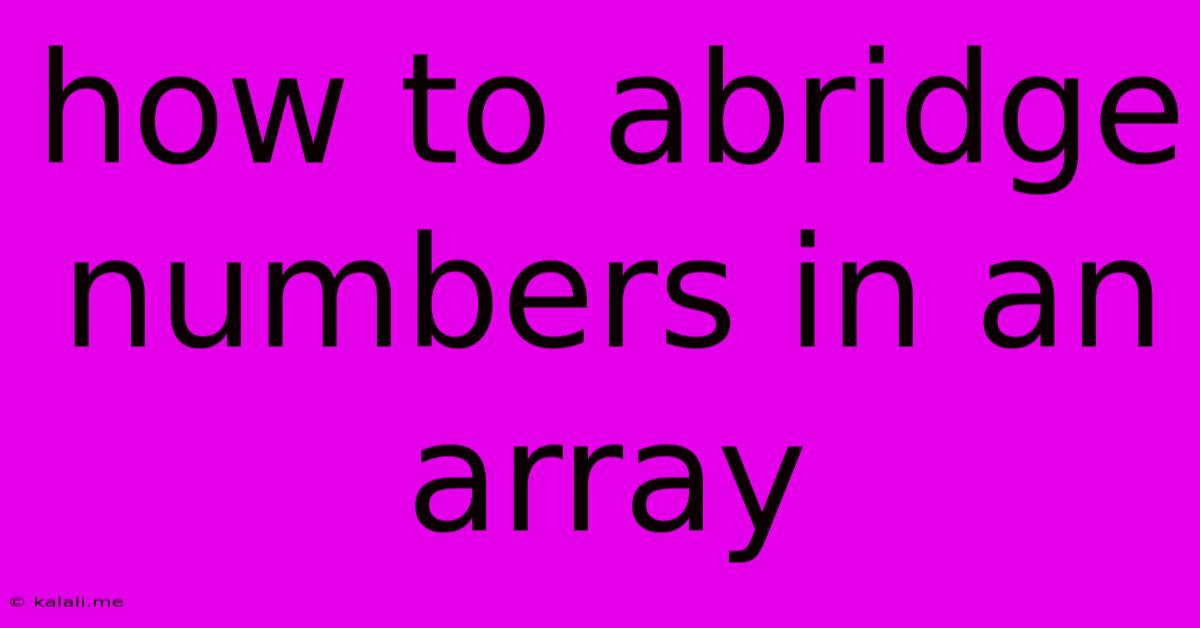How To Abridge Numbers In An Array
Kalali
Jun 08, 2025 · 3 min read

Table of Contents
How to Abridge Numbers in an Array: Techniques and Best Practices
This article explores efficient methods for abbreviating numbers within arrays, a common task in data processing and visualization. We'll cover various techniques, focusing on readability and performance. Understanding how to effectively abridge numbers within arrays can significantly improve the presentation and handling of large datasets. Whether you're working with financial data, scientific measurements, or population statistics, efficient number abbreviation is crucial.
Understanding the Need for Abbreviation
Large numbers in arrays can be cumbersome and difficult to interpret at a glance. Abbreviating them improves readability and allows for easier comprehension of data trends. For instance, displaying "1,000,000" as "1M" is far more concise and immediately understandable. This is particularly beneficial when dealing with arrays containing thousands or millions of numerical entries.
Common Abbreviation Methods
Several methods can be used to abridge numbers effectively within an array. Here are some of the most popular techniques:
-
Suffix-based abbreviation: This involves replacing a certain number of trailing digits with a suffix representing the magnitude (e.g., K for thousands, M for millions, B for billions).
-
Scientific notation: This represents numbers in the form of a * x 10<sup>b</sup>, where * is a single-digit number and b is an exponent. While concise, it might not be the most human-readable approach for all audiences.
-
Rounding: Rounding numbers to a specific number of decimal places is another method. This approach trades precision for simplicity and clarity.
-
Custom formatting: Depending on the specific needs of your project, you might need to implement a custom formatting function to tailor the abbreviation method to your preferences.
Implementing Abbreviation in Different Programming Languages
The implementation of these methods varies slightly depending on the programming language. Let's examine a few examples:
Python:
Python offers flexible tools for number abbreviation. Libraries like pandas provide built-in functionalities, while custom functions can be created for more specific requirements. Here's an example using a custom function for suffix-based abbreviation:
def abbreviate_number(number):
"""Abbreviates a number using suffixes (K, M, B)."""
if number >= 1000000000:
return f"{number / 1000000000:.1f}B"
elif number >= 1000000:
return f"{number / 1000000:.1f}M"
elif number >= 1000:
return f"{number / 1000:.1f}K"
else:
return str(number)
numbers = [1234, 567890, 12345678, 9876543210]
abbreviated_numbers = [abbreviate_number(num) for num in numbers]
print(abbreviated_numbers) # Output: ['1.2K', '567.9K', '12.3M', '9.9B']
JavaScript:
JavaScript also provides methods for formatting numbers. You can leverage the toLocaleString method or create custom functions similar to the Python example.
function abbreviateNumber(number) {
if (number >= 1000000000) {
return (number / 1000000000).toFixed(1) + "B";
} else if (number >= 1000000) {
return (number / 1000000).toFixed(1) + "M";
} else if (number >= 1000) {
return (number / 1000).toFixed(1) + "K";
} else {
return number.toString();
}
}
let numbers = [1234, 567890, 12345678, 9876543210];
let abbreviatedNumbers = numbers.map(abbreviateNumber);
console.log(abbreviatedNumbers); // Output: ['1.2K', '567.9K', '12.3M', '9.9B']
Choosing the Right Method
The optimal method depends on the context. For data visualization aimed at a general audience, suffix-based abbreviation is usually preferred for its readability. Scientific notation is more suitable for scenarios emphasizing precision and mathematical consistency. Rounding simplifies the data but sacrifices some accuracy. Consider your target audience and the level of detail required when making your selection.
By implementing these techniques, you can significantly improve the clarity and efficiency of your data handling and presentation. Remember to choose the approach that best suits your specific needs and context.
Latest Posts
Latest Posts
-
Why Did Aquaman Kill Black Mantas Father
Jun 08, 2025
-
Seurat Percentage Of The Largest Gene Expression
Jun 08, 2025
-
Saints Row Iv Re Elected Cheats
Jun 08, 2025
-
How Do You Get A Screw Out
Jun 08, 2025
-
How Do I Get Rid Of Gophers In My Yard
Jun 08, 2025
Related Post
Thank you for visiting our website which covers about How To Abridge Numbers In An Array . We hope the information provided has been useful to you. Feel free to contact us if you have any questions or need further assistance. See you next time and don't miss to bookmark.